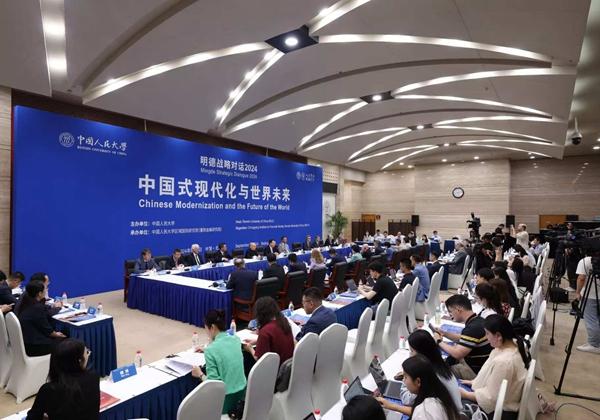
 0 Comment(s)
0 Comment(s) Print
Print E-mail China.org.cn, September 4, 2024
E-mail China.org.cn, September 4, 2024"My first time in China was in 1978, and I'm certainly impressed by the achievements China has made through reform and opening up since then," said Axel Goethals, CEO of the European Institute for Asian Studies, a think tank based in Brussels.

Participants attend the "Chinese Modernization and the Future of the World" symposium during the Mingde Strategic Dialogue 2024 in Beijing, Sept. 3, 2024. [Photo provided to China.org.cn]
Goethals was speaking at a symposium titled "Chinese Modernization and the Future of the World" during the Mingde Strategic Dialogue 2024, held from Aug. 30 to Sept. 3 in Beijing. The five-day event brought together scholars from the United States and Europe to discuss Chinese modernization and its global influence.
Goethals also pointed out that many Europeans, including policymakers and media figures, still cling to outdated and stereotypical views of China, shaped by perceptions from a decade or two ago. To address this, he emphasized the need for enhanced people-to-people exchanges, particularly in academia and among students, as a vital investment in fostering better China-Europe relations.
Zhang Donggang, secretary of the RUC Committee of the Communist Party of China, elaborated on the dialogue's goals by explaining the term "mingde." Drawing from the Confucian classic "The Great Learning," he explained that "mingde" signifies the manifestation of one's bright virtue. "By naming the dialogue 'mingde,' the organizer aims to present a true, positive and comprehensive view of China's development to the international academic community," Zhang said.
He expressed hope that the dialogue would deepen theoretical research on Chinese modernization and its practical applications, creating a high-level strategic platform for discussing global development issues. He also expected this exchange to contribute to building a human community with a shared future by digging into the global significance of Chinese modernization.
The symposium also introduced two research reports: "China's 'Compounding Interest': High-Quality Development and Outlook for 2035" and "Decisive Battle: The Progress of China's Comprehensively Deepening Reform and High-Standard Opening-Up in the New Era and Prospects for 2029 and 2035" published in March and August, respectively. The reports, co-released by the Chongyang Institute for Financial Studies in cooperation with think tanks in the United States, Russia, Canada and India, present a positive view of China's economic prospects and the well-being of its people.
During the discussions, participants explored the emerging opportunities and challenges associated with China's modernization, as well as the new tasks arising from the country's ongoing comprehensive reforms and opening up efforts.
Lou Chunhao, a researcher from the China Institutes of Contemporary International Relations, shared insights into the lessons that Chinese modernization offers the Global South countries. He summed up these lessons in four "Ss": "stable," referring to political stability; "sustainable," indicating the importance of long-term economic growth; "share," emphasizing the inclusiveness of Chinese modernization in benefiting all Chinese people; and "special," recognizing that each country's path to modernization is unique and should be tailored to its own circumstances. The fourth "S" challenges the notion that Westernization is the only viable model for modernization.
Martin Jacques, former senior fellow at the Department of Politics and International Studies, Cambridge University, emphasized the global impact of Chinese modernization, stating that it had not only transformed China but also influenced the trajectory across the developing world. He cited the Belt and Road Initiative as a prime example of China's positive contribution to global development.
The five-day Mingde Strategic Dialogue 2024, organized by Renmin University of China (RUC) and undertaken by the Chongyang Institute for Financial Studies, provided guests with an immersive experience, incorporating visits to enterprises, universities and rural areas in Shanghai, as well as Yiwu and Wenzhou in Zhejiang province, allowing them to witness the dynamic economic landscapes and distinctive urban cultures of China in the new era.
Go to Forum >>0 Comment(s)